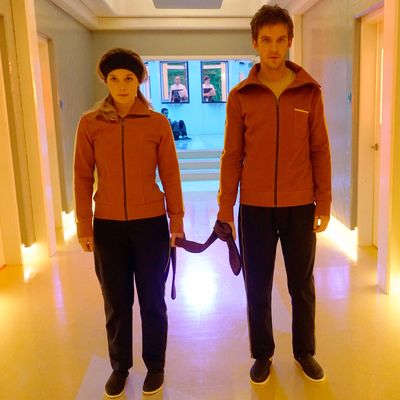
Noah Hawley became a TV power player by turning the Coen brothers’ hallowed filmography into his own playground with FX’s Fargo. Hawley used the original Oscar-winning film as the center of his storytelling merry-go-round, but as the series progressed, he’s gleefully spun together references that span the entire Coen universe — working in nods to The Big Lebowski, Miller’s Crossing, and other films. (With more surely to come, since the third season premieres on April 19.)
In Legion, Hawley has completely rebuilt a lesser-known character from the Marvel Comics universe named David Haller, largely transforming him into something defiantly original and new. Hawley reportedly discouraged cast members from reading the comic source material, making clear how much he views Legion as a stand-alone production.
Or almost stand-alone. As many critics have noted, including Vulture’s Matt Zoller Seitz, Legion is a show dense with allusions to other films, TV shows, books, and pop-culture ephemera. It’s one part David Lynch, one part Stanley Kubrick, one part Wes Anderson, one part H.P. Lovecraft, and, of course, one part Bryan Singer — and that doesn’t even cover all of it. Here are a few of the standout film and TV references found over the first few episodes of Legion.
Stanley Kubrick
According to Abraham Riesman’s behind-the-scenes feature, Stanley Kubrick haunted the development of Legion, and Hawley was somewhat obsessed with the the late, great filmmaker. You can see Kubrick’s touches all over Legion — and not just because the facility that’s treating David (Dan Stevens) happens to be named Clockworks Psychiatric Hospital. The “normalization” of David feels similar to the treatment of Alex (Malcolm McDowell) in the second half of A Clockwork Orange, and the orange jumpsuits definitely look like a product of the era. There’s also a sense in Legion that the design is meant to reflect the confused mental state of the protagonist — production designer Michael Wylie told the Daily Beast, “We’re not supposed to know where we are or what year it is” — and using design to reflect a character’s psychology is a very Kubrickian device utilized across several of his films. Hawley has even referred to Legion as existing in a “hybrid A Clockwork Orange/Quadrophenia world.”
The Matrix
As Legion has developed its story, we’ve seen more and more of the power David exerts over time and space, which can inspire a bit of a chicken and the egg argument when you’re talking about influences. Where did Hawley’s inspiration come from: popular films or the comic books that inspired those films? The Wachowskis’ Matrix was heavily reliant on comic-book storytelling vocabulary (along with a few nods to George Lucas’s Star Wars trilogy), so it would make sense that Legion echoes some of those same beats. Sometimes, however, those echoes can be really loud. When David plays with time, freezing it around him and moving matter within space, it can’t help but feel a little like what Neo: The TV Show might have looked like. (Honestly, I’m surprised that hasn’t happened yet. Give it time.)
David Lynch
Does the man-creature that haunts David’s memories remind anyone else of Bob from Twin Peaks? A terrifying vision that arises in times of great emotional and mental stress is only one of many Lynchian nods in Legion, as David’s “memories” also recall the “thing” that lived behind the dumpster in Mulholland Drive. The children’s story from hell — titled The Angriest Boy in the World — feels like yet another thing Lynch would have done, right down to the oddly practical effects of the book’s protagonist coming to life and hunting David. Hawley himself has cited Lynch’s work as an influence on Legion, and it will be interesting to see how that plays out as the season progresses.
Wes Anderson
It’s not just Legion’s aside to a Bollywood-esque musical number (to Serge Gainsbourg, no less!) or its dry sense of humor that calls Wes Anderson to mind. The Grand Budapest Hotel filmmaker’s twee DNA is all over the series, from Hawley’s symmetrical compositions to the fashion sense of his characters, which is strongly inspired by ’70s fashion and feels just flung out of time. Take note of the jumpsuits with the yellow stripe down the side, or the outfit that Amy Haller (Katie Aselton) wears to meet David at the Clockworks facility: They look like outfits from a Royal Tenenbaums–themed masquerade party.
The X-Men
It seems silly to say that a show based on an X-Men character is also influenced by that franchise, but it’s worth noting how subtly Hawley incorporates details from the film and book series into his show. Several critics have already noted Syd Barrett’s (Rachel Keller) similarity to Rogue — they can both absorb powers through contact — and Dr. Melanie Bird’s (Jean Smart) facility feels awfully familiar to the famous school run by Professor X. There are also visual touches that recall Bryan Singer’s films, which is still one of the dominant templates for how pop culture has interpreted the comic-book series. As it’s not quite clear how much Legion will reinterpret or adapt those comic books, fans are already trying to figure out exactly how this series will play into the existing Marvel canon. Although Legion feels stand-alone now, nothing has been ruled out. Hawley even noted in prerelease press that he waited a few episodes into Fargo to tie directly back to the film. “We had to earn that,” he said. So, who knows? That Wolverine cameo might still be a faint possibility.
Various Other References
• The idea of memories and emotions being more powerful than physical action — along with some of Legion’s visual sensibilities — could definitely be traced back to Tarkovsky’s Solaris.
• The pool scene, in which David is rescued after being dropped underwater and we linger with him as bodies fall below the surface, has echoes of the climax of Let the Right One In.
• Devices that control memories (as well as the importance of memory itself) is a big theme of Eternal Sunshine of the Spotless Mind, and Hawley’s comedic voice sometimes recalls that beautiful mixture of Michel Gondry’s visual oddities and Charlie Kaufman’s piercing self-examination.
• Hawley has compared Legion to Breaking Bad, which could be a spoiler as to where the story will go. What if this isn’t the origin of a hero, but rather a villain?
• Lenny (Aubrey Plaza) is so clearly a figment of David’s imagination that one almost has to compare it to Fight Club and Mr. Robot.
• It’s hard to escape the echoes of Terry Gilliam’s 12 Monkeys, given the mental-hospital setting and the time-travel motif.
• Is Syd Barrett a reference to Pink Floyd? Definitely, considering how the show’s score reflects the band. Hawley even confirmed this one: “In the first conversation I had with the show’s composer, Jeff Russo, I said that it should sound like Dark Side of the Moon. Because that album is the soundscape to mental illness to some degree.” Expect the Floyd nods to continue.


